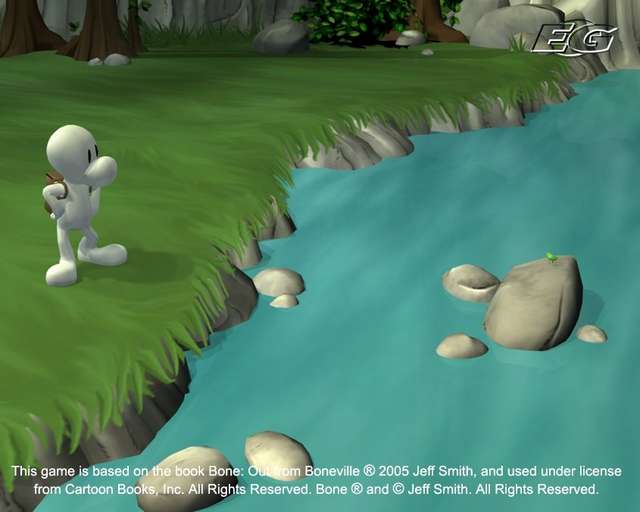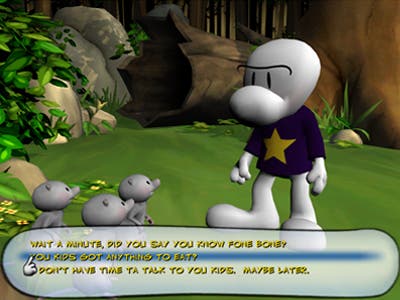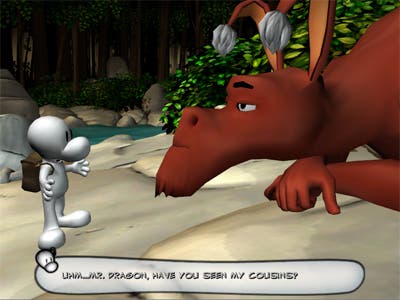Bone: Out From Boneville
One to pick?
It really wasn't that long ago when almost every other must-buy game seemed to emerge from the infinitely talented LucasArts, and the merest mention of a new one was enough to cause your heart to beat out of your chest. And then the second Star Wars trilogy spoiled everything and turned the once-peerless studio into a digital merchandising operation dedicated to milking the brand for all its worth.
Actually, it wasn't quite as straightforward as that. One-time LucasArts president Simon Jeffrey loved the creative energy of the narrative-driven classics (having famously laughed until milk came out of his nose upon reading the back of the Monkey Island box), and tried to steer the company away from its increasing reliance on the Star Wars cash cow.
In fact, under his four-year stewardship at the turn of the century, new Full Throttle and Sam & Max titles were commissioned as a means of signalling the change of direction. But it wasn't to be. Full Throttle 2 was wisely canned (for being a bit of an action-heavy travesty, by all accounts), but the merciless canning of Sam & Max: Freelance Police for basically not being Star Wars-related was an astonishing decision. Everyone close to the project was mystified how such a promising project could bite the dust in such a ruthless display of corporate indifference. Jeffrey left, the Star Wars-overload intensified and LucasArts had unwittingly followed its own dark path into creative doom. One can only hope that now the Star Wars movie bandwagon is over and done with, the company will begin to realise what it was that put the games division on the map in the first place.
Not the end. The beginning.

Most of us probably expected that to be the end of the story, but thankfully, good storytellers want to carry on spinning their yarns. And that's pretty much where Telltale Games came into being; born out of corporate indifference and forced to go it alone and do it their own way. In little over a year, the team's first game has emerged and you can download it right now from the company's own website, and pay just $19.99 for the privilege.
Based on Jeff Smith's much-admired comic books, the premise isn't based on some random creation, and just like many of the best LucasArts creations down the decades the concept is akin to a living comic book. With puzzles. And conversation trees. And silly little meandering ditties that worm their way into your brain. Welcome back. We've really missed you.
In the case of Bone: Out of Boneville, the game kicks off with three of the Bone clan stranded in the desert, and not feeling too good about life in general having been 'run out of town' for reasons we'll let you discover for yourselves. In the 'nice' corner, there's Fone Bone, the affable main character, while Phoney Bone (controllable later on) comes across as the exact opposite, being a cranky former millionaire who's lost all his dosh. Completing the trio is the slightly dippy serenading Smiley Bone - a character who sadly doesn't have a huge part to play in this 'episode' (assuming there are more - the end certainly gives the impression there will be).
Tall tales

If you're not familiar with the comics, the art style - as the screenshots illustrate - is very cute and simplistic, and entirely in keeping with the slick, stylised visuals and static 3D backdrops that point'n'clickers have long been comfortable with. You certainly won't be playing Bone for its jaw-dropping special effects or incredible animation, but it certainly has enough of an endearing style for that to not really matter at all. Clearly we're not here for that. We're here for the witty script, the endearingly-oddball cast of characters, the mind-melting puzzles, the well-judged voiceovers and improbable but hilarious storyline. Whether we get all of those is a matter for discussion in a moment, but that's what we signed up for.
In terms of mechanics, Telltale doesn't try and reinvent the wheel, and sticks to the tried and true context-sensitive command system that most adventures have been using for aeons. For example, talking to a character is merely a case of clicking on them and selecting from a four-pronged multiple choice list, while picking up an object or, say, moving around the screen is simplicity itself. The fact that literally anyone could work out what to do right from the kick-off is definitely a good sign. We really hate tutorials, and Bone is positively the last game that needs one.
Unlike the more expansive adventures of old, Bone is an immensely linear experience that's consistently set in a handful of locations with one or two puzzles at a time to worry about. By funnelling the player through the game like this, the solution is never that far away. In fact, probably the most instantly disappointing aspect of Bone is that its puzzles just aren't really taxing in any way. Not even for a moment. Anything you can interact with will cause the cursor to change in some way, providing instant realisation that this item is, indeed, important, and will be used to solve the next puzzle. If not on the screen you're currently on, or the next one. And if you're still left perplexed about what to do next, the in-built hint button makes it 100 per cent clear what you're supposed to do.
Kid's stuff

As such, it has the feel of a kid's adventure, in that it's not designed to be frustrating in any way, but still has enough amusing moments of dialogue to make it a pleasantly enjoyable experience to click your way through over the three to four hours or so that it lasts.
"Three to four hours?!?!" you're probably exclaiming right now. Well yes, but it is cheap. Maybe not really cheap enough, given its size and limited replay value, but it's a start.
So, given that the puzzles are astonishingly basic (from where we come from, anyway, in the land where rubber chickens and red herrings are king), do the characters, storyline and humour save it? Well, yes and no. It's one of those games you'll happily smile your way through, but rarely does it elicit full-on belly laughs. In some cases (playing bloody hide and seek, for one thing) you'll actually be quite irritated that these not-fun-at-all sequences were shoehorned in for no logical reason. When Bone is playing it straight, and tasking the player to have surreal conversations with giant insects, monsters and dragons, you have a nice warm feeling inside that you're getting the most out of the story and the talent behind it. But when it's making you walk around dark twisty-turny caverns or engage in rubbish run-up-the-screen interludes, you ponder how Telltale imagined that these were ideas that would make its game more fun.
Bone to pick
Then, just when you feel like you're getting somewhere with the game and have built up an affinity with the cast, the credits roll. Blimey. Is that it? We're huge fans of the genre, and really buy into the thought of regular episodic content, but we'd demand it at a significantly reduced price and with an approach that actually panders to the long-term fans of this style of game - as opposed to young kids with no patience. The fact that Telltale Games has grabbed the rights to Sam & Max is genuinely good news, but the team really needs to go back and look at what made the old adventure games great, because as much goodwill as we have for what the team is doing, we can't pretend that Out From Boneville was everything we hoped it would be. Having said that, adventure fans should still definitely give it a try, though - if only to support Telltale's endeavours to keep narrative-based gaming alive. Better luck next time, guys.

